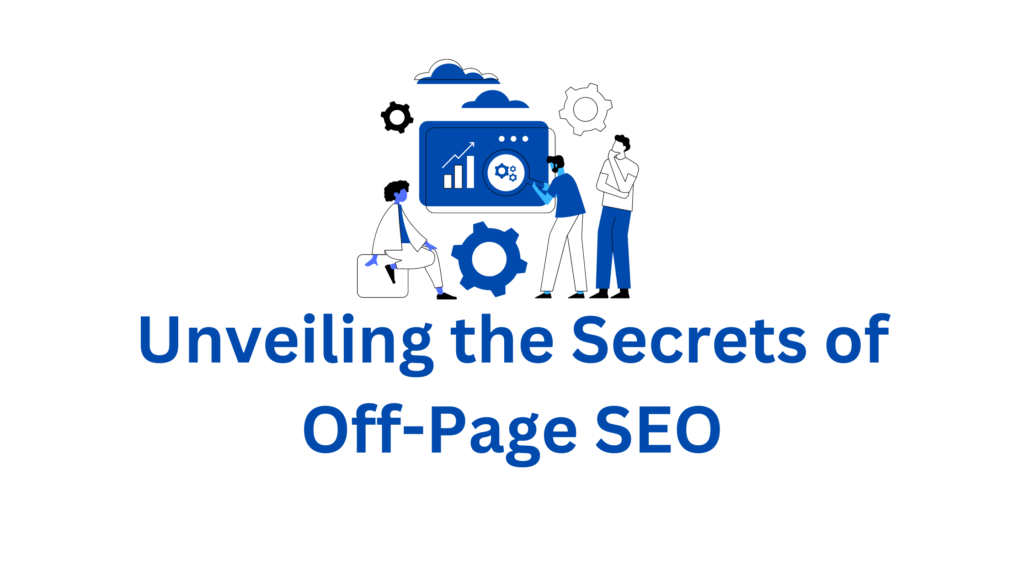Search Engine Optimization (SEO) plays a pivotal role in achieving these goals, and off-page SEO techniques are essential for establishing credibility, authority, and driving organic traffic. In today’s digital landscape, the success of any website or online business relies not only on the quality of its content but also on its visibility and reputation across the vast realm of the internet. In this comprehensive guide, we will dive deep into the world of off-page SEO and unravel its secrets, equipping you with the knowledge to boost your online presence and unlock new possibilities for growth.
What is Off-Page SEO?
Off-page SEO primarily revolves around building high-quality backlinks, but which are links from other websites that point to your site. Backlinks are considered as “votes of confidence” or endorsements from other web pages, indicating that your content is valuable and trustworthy. Search engines, like Google, view backlinks as a signal of authority and relevance, which can positively impact your rankings in search results.
Some common off-page SEO techniques include:
- Link building: Actively acquiring high-quality backlinks from reputable and relevant websites through various methods such as guest blogging, influencer outreach, content promotion, and directory submissions.
- Social media marketing: Leveraging social media platforms to promote your content, engage with your audience, and attract more shares, likes, and comments. Social signals can indirectly influence your search rankings.
- Online reputation management: Monitoring and managing your brand’s online reputation by addressing customer reviews, participating in online discussions, and maintaining a positive image across different platforms.
- Influencer marketing: Collaborating with influential individuals or experts in your industry to expand your brand’s reach, gain credibility, and attract more traffic and backlinks.
- Content marketing: Creating valuable and shareable content, such as blog posts, infographics, videos, and ebooks, to attract backlinks naturally and engage with your target audience.
- Social bookmarking: Submitting and sharing your content on social bookmarking websites to increase its visibility and generate traffic.
- Forum participation: Engaging in relevant online communities and forums to provide valuable insights, answer questions, and establish yourself as an authority in your field.
- Local SEO: Optimizing your website and online presence to target local search results, including creating and optimizing Google My Business listings, obtaining local citations, and encouraging customer reviews.
The Evolution of Off-Page SEO
Off-page SEO refers to the activities conducted outside of your own website to improve its visibility and ranking in search engine results pages (SERPs). Over the years, off-page SEO techniques have evolved in response to changes in search engine algorithms and user behavior. It’s important to note that off-page SEO is an ongoing process, and new techniques and strategies will continue to evolve as search engines and user behavior change. But staying up to date with industry trends and best practices is essential for successful off-page SEO implementation. Here’s a timeline highlighting the key stages in the evolution of off-page SEO:
Link Building Era
- Importance of Backlinks: Backlinks were considered a crucial ranking factor. But the quantity and quality of backlinks from other websites played a significant role in determining a website’s authority and relevance.
- Directory Submissions: Website owners submitted their sites to various web directories to gain backlinks and increase visibility. But you have to very careful which directory are you submitting to.
- Article Submissions: Articles were created and distributed to article directories, allowing website owners to include backlinks in the author bio section.
- Link Exchange and Link Farms: Websites engaged in link exchanges or joined link farms to artificially inflate their backlink profiles. This approach often led to low-quality links. When you need link exchange you have offer something in return.
Quality Over Quantity
- Google Algorithm Updates: Google, the dominant search engine, released algorithm updates such as Panda, Penguin, and Hummingbird, which aimed to improve search results’ quality.
- Focus on Link Quality: The emphasis shifted from quantity to quality. Search engines began penalizing low-quality and spammy links, favoring natural and authoritative links.
- Guest Blogging: Websites sought to contribute high-quality guest posts to reputable blogs and websites within their niche to earn valuable backlinks and increase exposure.
- Social Signals: Search engines started considering social signals, such as shares, likes, and comments, as indicators of a website’s popularity and relevance.
- Influencer Marketing: Collaborations with influencers and industry experts became popular for gaining exposure, backlinks, and social mentions.
User-Centric Approach and Brand Building
- E-A-T and Expertise: Google’s E-A-T (Expertise, Authoritativeness, Trustworthiness) concept gained prominence, rewarding websites with high-quality, expert-authored content and strong reputations.
- Brand Building and Mentions: Search engines began factoring brand mentions, even without backlinks, as signals of authority and relevance.
- Online Reputation Management: Building a positive online reputation became crucial, as reviews, ratings, and customer sentiment impacted search engine visibility.
- Influencer SEO: Leveraging influencers for SEO purposes expanded beyond link building, but focusing on brand awareness, social mentions, and content amplification.
- Voice Search Optimization: With the rise of voice assistants, when optimizing content for voice search queries gained importance, requiring a more conversational and natural language approach.

Link Building Strategies
- Create High-Quality Content: Producing valuable, informative, and engaging content is crucial. When you create compelling content, other websites are more likely to link to it naturally.
- Guest Blogging: When reach out to authoritative websites in your industry and offer to write guest blog posts.
- Broken Link Building: Find broken links on relevant websites and contact the site owners to inform them. Offer your content as a replacement, and if they accept, you’ll have gained a valuable link.
- Skyscraper Technique: Reach out to websites that linked to the original content and let them know about your improved piece, increasing the chances of them linking to your content instead.
- Resource Link Building: You have reach out to relevant websites, bloggers, and industry influencers to let them know about your resource, increasing the likelihood of them linking to it.
- Influencer Outreach: Build relationships with influencers in your industry and collaborate on content or projects. But influencers often have large audiences and can provide valuable backlinks and exposure to your website.
- Social Media Promotion: When sharing your content on social media platforms to increase its visibility and encourage others to link to it. Engage with your audience and encourage them to share your content, increasing the chances of it being linked to by others.
- Online Directories and Listings: Submit your website to relevant online directories and listings, such as industry-specific directories or local business directories. These can provide valuable backlinks and increase your website’s visibility.
- Testimonials and Reviews: Provide testimonials or reviews for products or services you’ve used, particularly on websites related to your industry. Often, you can include a link back to your website when providing these testimonials.
- Internal Linking: Ensure your website has a well-structured internal linking strategy.
Social Signals and Social Media Marketing
Social signals in the context of social media marketing refer to the metrics and interactions that indicate how users engage with content on social media platforms. When these signals can include likes, shares, comments, followers, mentions, retweets, and other forms of engagement. Social signals are valuable because they provide insights into the popularity, reach, and effectiveness of content.
Social media marketing utilizes social signals to understand audience behavior, measure the success of campaigns, and make data-driven decisions to optimize marketing strategies.
The Impact of Social Signals on SEO – Social media engagement and search engine ranking
The impact of social signals on SEO, specifically social media engagement and search engine ranking, has been a topic of discussion among marketers and SEO professionals. While social signals do have some influence on SEO, the extent of that impact and the specific ranking factors involved can vary.
- Indirect Influence
- Increased Website Traffic
- Social Signals as Ranking Factors
- Brand Authority and Trust
- Backlinks and Social Sharing
However, it’s important to note that social signals are just one aspect of SEO, and they should be considered as part of a comprehensive strategy. Content quality, relevance, website structure, keyword optimization, and other traditional SEO factors still play a significant role in determining search engine rankings. Therefore, while social signals can have an impact on SEO, they should be seen as part of a broader approach rather than the sole focus of your optimization efforts.
Crafting an Effective Social Media Strategy
Crafting an effective social media strategy requires careful planning and consideration of your goals, target audience, and the platforms you’ll be using. Here are some steps to help you create a successful social media strategy.
- Set Clear Goals:
- Identify Your Target Audience:
- Choose the Right Platforms:
- Conduct Competitor Analysis:
- Develop Your Brand Persona:
- Create Engaging Content:
- Plan a Content Calendar:
- Use Visuals and Multimedia:
- Engage with Your Audience:
- Monitor and Analyze Performance:
- Stay Updated and Evolve:
Amplifying Off-Page SEO with Social Media Advertising
When it comes to amplifying off-page SEO with social media advertising and maximizing ROI, there are several strategies you can employ. By combining the power of social media platforms and paid advertising campaigns, you can enhance your off-page SEO efforts and drive more traffic to your website. Remember that social media advertising should be seen as a complement to your off-page SEO efforts. By integrating these strategies effectively, you can maximize the impact of your campaigns and drive more traffic to your website while enhancing your overall SEO performance.
Online Reputation Management
Online Reputation Management (ORM) refers to the process of monitoring, influencing, and managing an individual’s or a company’s reputation on the internet. With the widespread use of the internet and social media platforms, ORM has become increasingly important for individuals and businesses alike.
The goal of online reputation management is to create a positive online presence, build credibility, and mitigate any negative information or content that could harm an individual’s or organization’s reputation.
Techniques for Enhancing Online Reputation
Online reputation management plays a crucial role in establishing trust and credibility for individuals and businesses alike. With the prevalence of search engines and the ease of accessing information online, a strong online reputation can significantly impact search engine visibility and trustworthiness.
Search Engine Visibility
Search engines, such as Google, aim to provide the most relevant and reliable information to their users. They take into account various factors when determining search rankings, and online reputation is one of them. A positive online reputation can positively influence search engine visibility in the following ways.

- Higher Search Rankings: Search engines favor websites and content that are trusted and well-regarded by users.
- Enhanced Click-Through Rates (CTR): Higher CTR signals to search engines that the website is relevant and valuable, which can further improve search rankings.
- Social Signals: Social media presence and engagement can also impact search engine visibility. Search engines may take these signals into consideration when determining rankings.
Trust and Credibility
Trust is a vital factor in the digital realm, where users rely on online information to make decisions. An online reputation management strategy that focuses on building trust can have several benefits.
- Establishing Credibility: A positive online reputation helps establish credibility and expertise in a particular field. When individuals or businesses are recognized as trustworthy, it becomes easier to attract customers, partners, and opportunities.
- Building Consumer Confidence: Positive reviews, testimonials, and ratings contribute to consumer confidence.
- Managing Negative Feedback: Online reputation management involves effectively addressing and managing negative feedback. Responding promptly and professionally to negative reviews or criticisms demonstrates accountability and a commitment to customer satisfaction. This can help mitigate potential damage to reputation and preserve trust.
- Word-of-Mouth Recommendations: Online reputation extends beyond search engines. Positive online experiences and customer satisfaction can lead to word-of-mouth recommendations, both online and offline, further boosting reputation and trust.
In Conclusion
In this comprehensive guide, we have delved into the secrets of off-page SEO, unveiling its various aspects and providing you with a solid understanding of its importance and potential impact. By implementing effective link building strategies, harnessing the power of social signals, and managing your online reputation, you can enhance your website’s visibility, drive organic traffic, and establish your brand as an authority in your niche. Remember, off-page SEO is an ongoing process that requires consistent effort and adaptability. By staying up-to-date with the latest trends and best practices, you can leverage the power of off-page optimization to unlock new opportunities for growth and success in the dynamic world of digital marketing.
